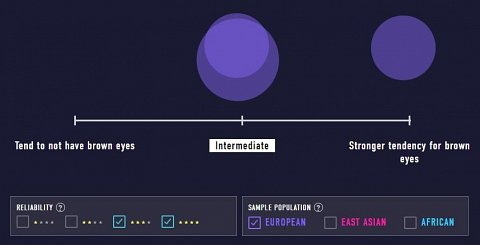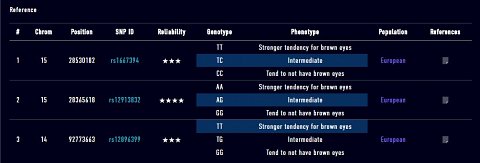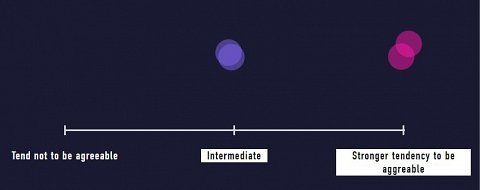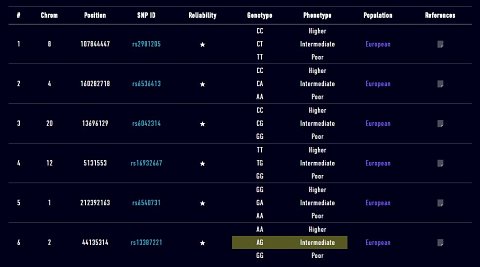-
Genome Link
review on 28 June 2018
by Rebecca Fishwick

At a Glance
Summary
Overall, I found the service offered by Awakens to be fun, well-presented, and easy to navigate. I was able to view my results for many traits for free, with the option to upgrade if I wished. I was able to view the sizes of the studies done on each trait, and which ethnic groups the studies had been conducted on, as well as the individual genetic variants they had looked at in my genomic data. Though some traits (particularly ones to do with personality) had only a very tenuous connection to genetics, it was still interesting to see the results I’d been given.
Full Review
Awakens is a genomic applications company based in Tokyo, Japan. In 2017, Awakens was founded by their C.E.O., Tomohiro Takano, as well as Yuta Matsuda, C.O.O., and Takamasa Kudo, their Scientific Collaborator. The company aims to empower people with knowledge of their DNA, and create an infrastructure where consumer genomics are available for all.
Product Expectations
The Genome Link website was impressive and sleek. I immediately saw that I could upload my genetic data for a free analysis, either from 23andMe, Ancestry.com or MyHeritage.
Scrolling down, I could see a demo of their analysis tools, which appeared to form a comprehensive web app, where I could view different areas influenced by my genetics, including body traits, personality, intelligence, food and nutrition, and sports.
I saw that one of their newer features was personality analysis based on the “Big Five Theory”. I looked up the Big Five personality traits, and found that they were “openness to experience”, “conscientiousness”, “extraversion”, “agreeableness”, and “neuroticism”. The theory dated from the twentieth century, though recent research had gone into its genetic basis.
I read that Awakens complied with the requirements of the Health Insurance Portability and Accountability Act (HIPAA) regarding protecting health information. They would never use or sell my genomic data, even anonymously. They acknowledged my ownership of my data, and I had a right to delete it from their server at any time.
There were links showing me where I could download my data from 23andMe, Ancestry.com, and MyHeritage. Apparently, it would only take one minute for my data to be uploaded.
Ordering Experience
Clicking the button to sign up, I saw I had only to give an email address and password. There was a link to their Privacy Policy, and I decided to take a look.
Here, I found that Awakens may send me offers from third parties, though only if I consented. In addition to collecting my genotype information, they would also collect any personal information I might provide. They would also collect non-personally identifiable web behaviour information through cookies and analytics tools. If I were to log in using a social network account (e.g. Facebook), then Awakens may use unique identifiers to track my usage of it. This may also allow Awakens to improve their targeted advertising. Aggregated, non-personally identifiable information may be shared with third parties.
Although Awakens took measures to protect the confidentiality and security of my information, they were unable to guarantee it, due to the “inherent risks associated with storing and transmitting data electronically”. They would disclose my information if required to do so by law.
Having read through their policy, I went ahead and created my account. I was immediately sent a verification email, and had to confirm my email to continue.
Before uploading my data, I had to agree to their Informed Consent form, as well as their Privacy Policy and Terms of Use.
In the Terms of Use, I read that the results given by Awakens did not constitute medical advice, and they did not guarantee any outcome or results. They would be liable for any harm that may arise from my results.
In the Informed Consent document, I found I had to be over 18 in order to participate. I had to acknowledge that the report would not include any variants relating to medical conditions, that none of the information provided would be medical advice, that current knowledge of genomics was incomplete, that I may learn unwelcome information from my report (e.g. about my biological parentage), and that genetic counselling was available to me.
Weirdly, they claimed that they would send my results to my healthcare provider, which didn’t exactly sound ethical. This was more bemusing than troubling, since I hadn’t provided any information about my healthcare provider and didn’t intend to, and I doubted they would find my doctor’s name and address printed in my genetic code.
Going to upload my data, I found I could upload it as a .txt or .zip file. A little bar showed the progress of my upload, which took about a minute. I then had to wait for my genomic data to be validated (which took less than a minute). Then I was able to access the database.
The Results
I found that I had access to 20 traits for free. If I wished, I could upgrade to “Premium” for a one-time payment, or “Unlimited” for a monthly subscription, which would allow me to access all 60+ traits.
Results Section: Physical Traits
The physical traits I had access to were: eye colour, beard thickness, morning person, genetic weight, BMI, red hair, black hair, motion sickness, lobe size, and body fat percentage. Clicking on my first trait, I found I could play a tutorial video showing me how to refine my results for sample population (the options were European, East Asian, and African), and reliability (which depended on the study’s sample size, statistical significance, etc.). I found that most studies used only European data, and so often it was unnecessary for me to filter them.
According to my genetic results, I had an average likelihood for having brown eyes. A diagram indicated the size of the studies that had found the correlations between different genotypes and eye colour (shown below).

A diagram visualising the eye colour research studies.
Larger bubbles indicated a greater sample size for the study (meaning more reliable data). As you can see, the studies had used only European participants, though I could filter for reliability (which removed the two smaller bubbles).
I could also view the exact genes they had looked at in my genetic data. In order to predict my eye colour, they had looked at three genetic variants to see which genotype (variation in a gene) I had (shown below).

My genetic variants for eye colour.
I saw that one genotype gave me a stronger tendency for brown eyes, while the other two gave me only an intermediate likelihood of having brown eyes. I could also check the reliability of the studies done on each variant.
For certain traits, such as “Beard Thickness”, my genetic tendency was “inconclusive”, since the raw data I’d provided did not contain the genetic information they needed. Had I paid for a premium or unlimited service, I would want to know which of my traits would be covered by my raw data in advance, so as to avoid disappointment.
For some traits, such as “Morning Person”, I either did not have enough of the relevant variants in my raw data, or the studies were not comprehensive or conclusive enough to offer a clear result (shown below).

My inconclusive Morning Person result.
I found I was as likely to be a morning person as I was to be a night owl, or to fall somewhere in between. Though they looked at several genetic variants, I had only three of these variants in my raw data, all offering conflicting results. I also saw that the reliability of the study was not very great.
This isn’t to say that I thought the results they gave were inaccurate. A couple of the traits they listed included tendencies for red or black hair. I found I was unlikely to have either – which is perfectly true. However, I found it odd that I was still given results for some traits when my data did not include all or even most of the variants they looked at.
Results Section: Personality
In the personality section, I found I had a stronger tendency to be agreeable. I found this pretty flattering, though only for a moment. Scrolling down to the study details, I discovered that the studies showing a relationship between a stronger tendency for agreeableness and certain genotypes had been done on East Asian populations (shown below).

A diagram showing the research studies for Agreeableness.
While this didn’t necessarily make me disagreeable (the European studies gave me a more-or-less neutral score), it meant that the studies done on East Asian people were less reliable for me. Still, the studies done were quite small, and so not terribly reliable anyway.
Other personality traits included neuroticism (I didn’t have a score for this), extraversion, conscientiousness, openness, and reward dependence. According to the research, I wasn’t particularly extraverted, open-minded, or reward dependent. My score for conscientiousness was only intermediate. I wasn’t exactly offended by all this: the studies done on genetics and personality were all quite small, and so the results were not terribly reliable. I got the impression that this was a pretty new area of research, and so these results were provided mostly for fun.
Results Section: Intelligence
Since I wasn’t yet done with being mildly insulted, I had a look at my intelligence results. For “Childhood Intelligence”, I found my score was only intermediate. Still, looking through the table of genotypes they had looked at, I found my raw data only included one of the six genetic variants they used to achieve this score (shown below).

The genetic variants for Childhood Intelligence.
While I had one genotype associated with middling childhood intelligence, I may have had other variants associated with lower or higher intellect. And again, the research done on this was not statistically very significant.
Similarly, I found I had one genotype associated with better hearing function, and so I had been given a high score, though my data was missing four more variants associated with this. For reading and spelling ability, I had two genotypes that suggested my abilities were only intermediate, and three others unaccounted for. It also occurred to me that it wasn’t clear which of these genotypes had more bearing on my results: it may be that one gene had a very strong association with reading ability, while others had only a very weak connection.
Summary
Overall, I found the service offered by Awakens to be fun, well-presented, and easy to navigate. I was able to view my results for many traits for free, with the option to upgrade if I wished. I was able to view the sizes of the studies done on each trait, and which ethnic groups the studies had been conducted on, as well as the individual genetic variants they had looked at in my genomic data. Though some traits (particularly ones to do with personality) had only a very tenuous connection to genetics, it was still interesting to see the results I’d been given.


